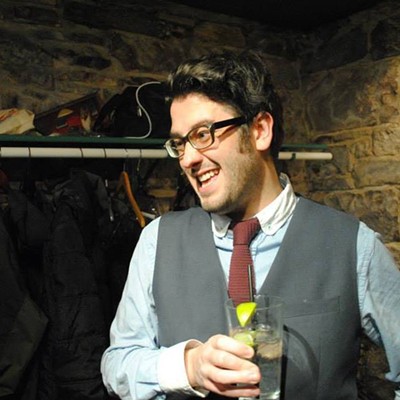Denver's park-going residents have long enjoyed wiling away temperate afternoons sunning themselves on the gently sloping hills of Cheesman Park. Whether you're strolling through the park's neoclassical pavilion, enjoying the view of the distant cityscape over the treetops, or happening upon an especially festive Quinceañera, you'll always find good times in Cheesman Park -- along with the occasional human skull.
See also: City Park: A stroll in the heart of Denver
From 1858 until 1907, the 320 acres that now comprise Cheesman Park and the Denver Botanic Gardens were home to thousands of departed souls. Mt. Prospect Cemetery, a religiously and ethnically segregated burial ground for Denver's founding citizens, eventually fell into disrepair and was referred to as simply the "Old Boneyard" -- feel free to insert your own joke about Cheesman's notorious reputation as a nighttime cruising spot for aging gay men here-- before wealthy residents and realtors requested that the area be turned into a public park.
Initially, all 320 acres were converted into Congress Park, until the parks were split by a residential area and the park was renamed after pioneer Walter Cheesman, whose family funded the pavilion. The area currently known as Congress Park used to be the Hebrew cemetery at the easternmost edge, which was separately owned and managed its re-burials better then the greedy gentiles to the west. A majority of the unclaimed plots there belonged to impoverished vagabonds, proving that Denver's poorest people have always been subject to the forces of gentrification, even in the grave. Families were given ninety days to claim their deceased loved ones. Wealthy families moved the bodies to nearby cemeteries. A majority of the Hop Alley immigrants' bodies were shipped home to be buried in Chinese soil. No one would claim the scores of paupers, thieves and prostitutes buried there, so the city hired shady undertaker E.P. McGovern to exhume all the buried bodies, put them in a new casket and relocate them to the newly built Riverside or Fairmount cemeteries. Infamously paid $1.90 for each relocated casket, McGovern increased his profits (and general hauntability) exponentially by hacking up corpses and distributing stray limbs in three-foot-long pine boxes intended to bury children. McGovern and his workforce also left graves open for years and allowed widespread looting of corpses, despite overwhelming consensus in the ghost community that burial desecration is just the rudest thing. As if hacking up bodies to maximize his grisly payday weren't enough, McGovern never finished the job: An estimated 2,000 corpses remain interred beneath the parkland green.And as if jumbling the bones of the departed wasn't curse-worthy enough, Cheesman Park is also located on claim-jumped land sacred to the Arapaho. Visitors should brush up on Cheesman's history before any visit, so they can liven up their picnic conversations with reminders of what monsters our ancestors were!
Though it's impossible to verify, Cheesman's paranormal activity ranges from tales of visitors and neighborhood residents experiencing inexplicable feelings of grief and dread at the park, to people having difficulty rising from the grass as if they were weighted down by some spiritual force, to truly nightmare-inducing reports of a chorus of disembodied voices whispering and groaning near the site of the mass graves. Specters of a singing woman, vanishing children and formless shadows are all purported to wander the grounds after nightfall. Like all supernatural sightings, these reports, sourced from less-than-reputable corners of the internet, could be tantamount to psychological projections, perhaps a way to reconcile the ghoulish business of centuries past. Perhaps spooked Denverites mistook the furtive whispers of a late night hook-up for a cry from beyond. If, however, ghosts do in fact exist, the ones in Cheesman Park are furious.
Life is for the living, however, and the atmosphere at Cheesman is far from funereal these days. Picnics, fun runs, weddings and the annual Cheesman Park Art Festival draw huge crowds, with most people blissfully unaware that they're playing frisbee with their dogs mere feet above someone's final resting place. Along with its more sordid reputation as a cruising hotspot, Cheesman has long been a hub of Denver's GLBT community. Every year, PrideFest gathers at Cheesman and leads the parade west from its grounds.While Cheesman Park may lack bodies of water, recreation centers and sporting fields, it's an essential part of Denver's urban landscape. As a meeting place and leisure center, Cheesman Park is an inviting place by day, offering a sun-dappled shortcut through the Capitol Hill neighborhood. And as an emblem of Denver's tragic willingness to cannibalize bits and pieces of its own history for a quick profit, Cheesman Park's grim origin story is endlessly fascinating. The park's nighttime occupants, be they amateur paranormal investigators or hopeful dudes looking to get blown by a kindly stranger, are my kind of people.
Follow Byron Graham on twitter @ByronFG for more mildly amusing sequences of words.











